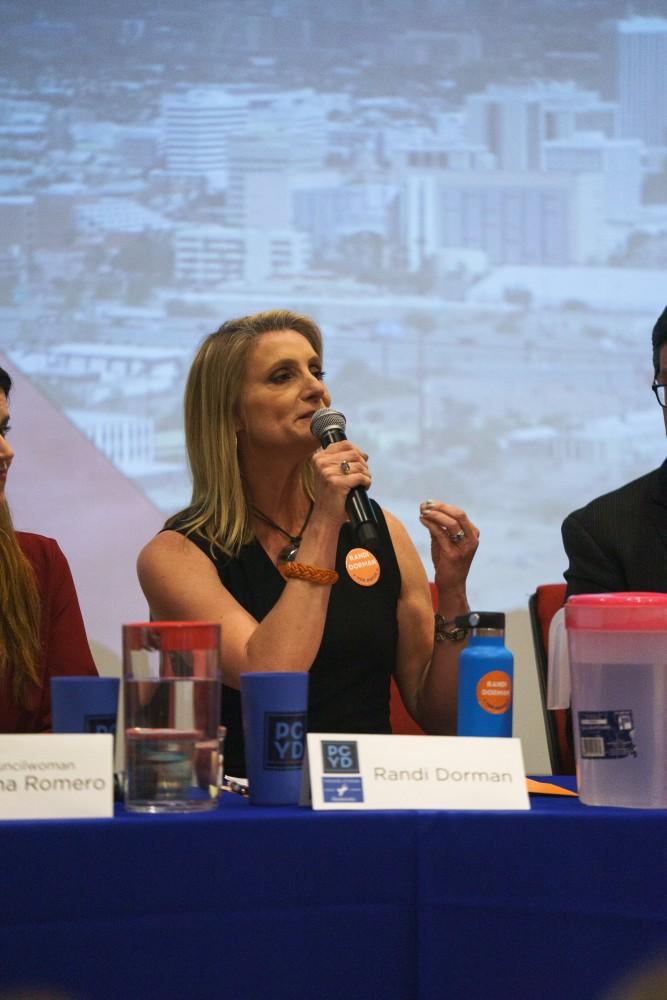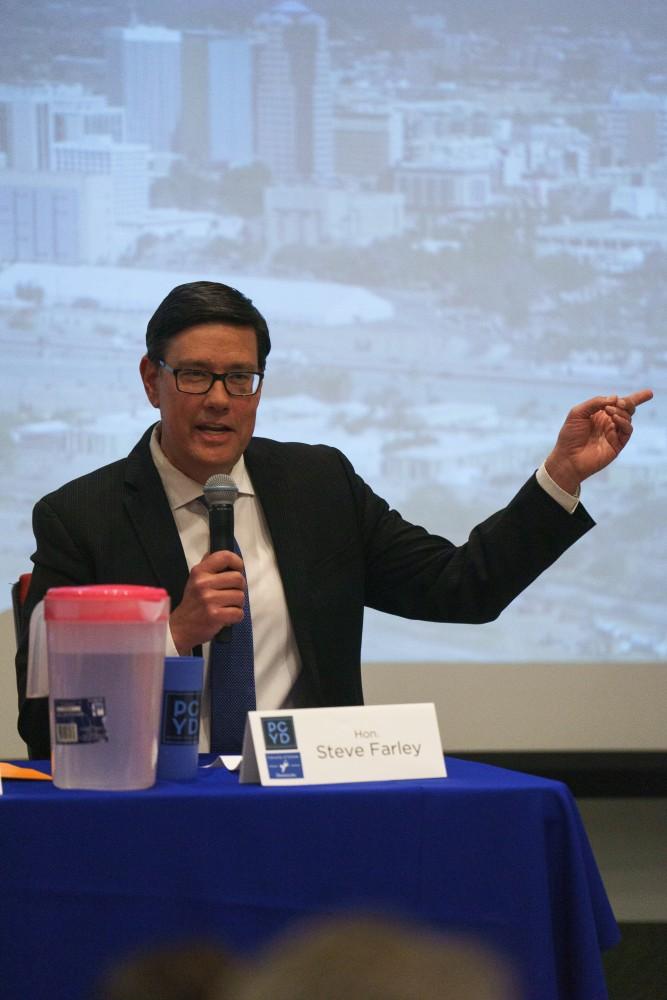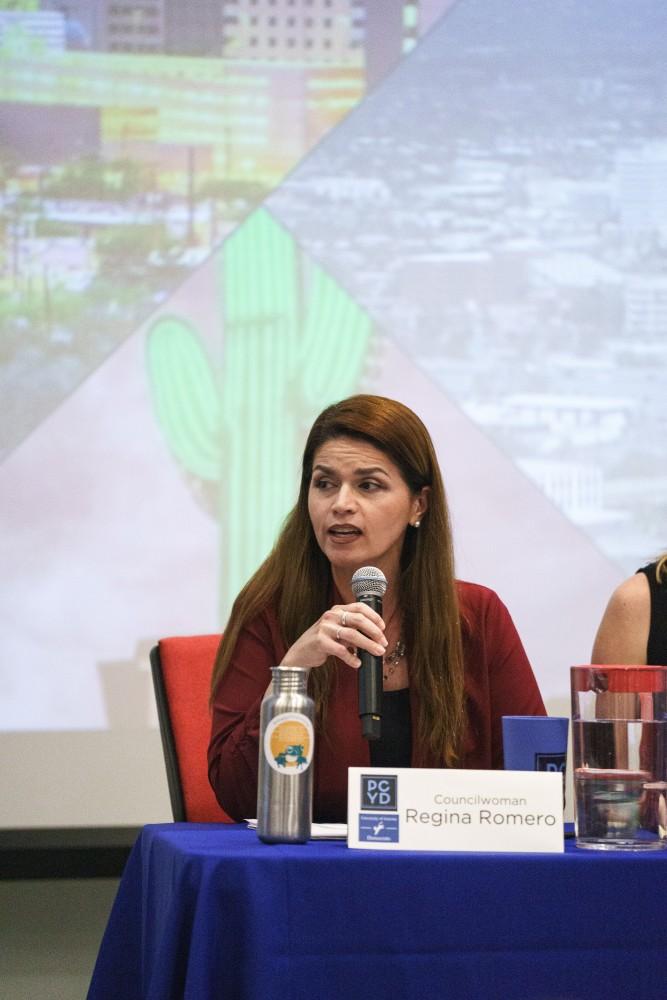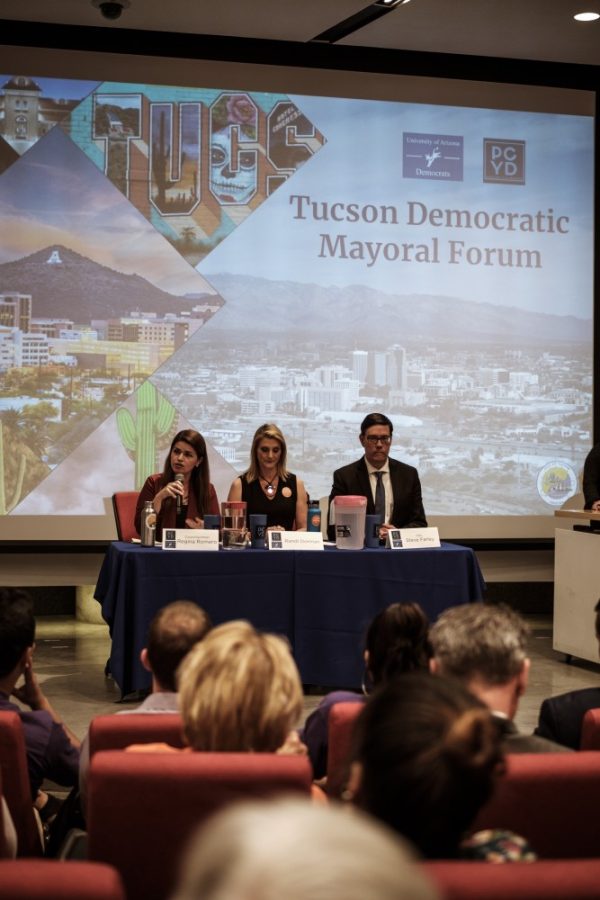Tucson Democratic mayoral candidates focused on immigration, city development and education at a forum in the ENR2 Building at the University of Arizona on Thursday, April 18.
Randi Dorman, Steve Farley and Regina Romero are among the Democratic candidates running in this year’s race. All three were present at the forum. The forum was organized by the Pima County Young Democrats and University of Arizona Young Democrats.
RELATED: ASUA election results are in: Meet your new student body government
Dorman is a developer who focuses on Downtown Tucson and has previously served as President of the Museum of Contemporary Art. Farley has served in the Arizona State Legislature for 12 years and is also an artist and graphic designer. Romero is currently a city councilwoman representing Ward One and a UA alumna.

Immigration
The three candidates expressed their support for immigrants and refugees residing in Tucson.
Romero said she helped make Tucson an immigrant-welcoming community because she helped lead the opposition of Senate Bill 1070 in 2010, which required law enforcement officers to determine a person’s immigrant status if they had reasonable suspicion.
Farley said he started a Facebook group called “Arizona Welcomes Refugees” when Governor Doug Ducey said in 2015 that Arizona doesn’t need more refugees.
“The reason Tucson is as strong and diverse as it is is because of the immigrants in our community,” Farley said.
Dorman wants to strengthen support for non-profits that help immigrants and refugees.
“As mayor, I would make sure that the city convened those organizations and had a specific approach to servicing the immigrant and refugee population,” Dorman said.
The candidates were also asked why they haven’t come out in support of an initiative that would make Tucson a sanctuary city.
Farley said the best case situation would be that the situation remains the same, but the sanctuary city title is in the charters. The worst case scenario, he said, was Tucson becoming a target of hate crimes because of the title.
Dorman also explained her reasons for not publicly supporting the initiative.
“There are important ideas in the initiative, but it seemed to be a political solution when a practical one exists,” she said. She also said the city can continue to work with the Tucson Police Department and other resources to make sure refugees are safe.
Romero said she agrees with the sentiment of the initiative but it leaves Tucson in a precarious financial position.
“These sanctuary cities are in California, or Seattle, Washington,” Romero said. “They are not in Arizona. In Arizona, the state legislature has been micromanaging cities for the past ten years and passing anti-immigrant laws that hurt our communities.”

City Development and Public Transportation
All three candidates said the balance of maintaining culture while continuing to develop the city is important.
“As a city, we need to have somebody who is willing to be able to make sure that what makes Tucson unique is what we keep,” Farley said.
Dorman said the city needs to work with the neighborhoods when considering development.
“The mayor and the council have the ability to be discretionary about what gets developed and what the right balance is,” Dorman said. “It’s important that we preserve character. Our culture here is so important.”
Romero wants to make sure Tucson remains affordable.
“We have to make sure that, as we continue to develop, that we develop with an eye to equity and an eye to design,” Romero said.
In response to a question asked about public transport systems in Tucson, Dorman and Romero emphasized the importance of investing in electric transport.
Dorman said a city can’t thrive if its population can’t move around efficiently.
“As mayor, I would put a halt to future purchases of fossil fuel vehicles for our city fleet and for our buses and migrate to an electric system,” Dorman said.
Romero said Tucson needs to continue investing in the Tucson transit systems.
“The transit system should be part of the sustainability conversation,” Romero said. “The transit system itself needs to become electric and it needs to become more affordable and reliable for our community.”
Farley said that public transport is important to Tucson because it creates civil society.
“There are 30, 40, 50 of you riding in the same space … and you might actually meet somebody you never would have run into any other way. That creates a good civil society,” Farley said. “The more we isolate ourselves, the more trouble we get into politically and policy-wise. Public transit creates the root of a good democracy.”

Education
The three candidates expressed their support for last year’s Red for Ed movement.
“We got $415 million for public education this year alone because we worked together and we got it done with the pressure of those teachers,” Farley said. He also said the city needs to include education as a priority in the charter.
RELATED: Q&A with the leaders of the Graduate and Professional Student Council
Dorman addressed the lack of city funding towards education.
“The city at this point does not directly fund education, but there’s so much we can do in terms of educational support programs,” Dorman said.
Romero said every child in Arizona deserves an opportunity to receive education.
“The mayor has a bully pulpit to promote investment in education,” she said.
Follow Priya Jandu on Twitter









